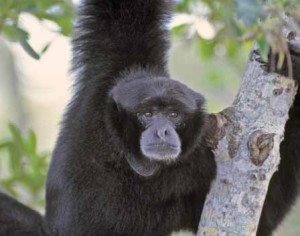The New Threat to Tigers & Orangutans Snacks and Shampoo
by Tim L. Tetzlaff
Director of Conservation & Communications | Naples Zoo at Caribbean Gardens
 Imagine you’re creating a plan to build an interstate through a mountainous area with two possible routes. Option A goes through already cleared lands; Option B will displace thousands of people as it cuts through multiple neighborhoods and schools. Your choice seems obvious. But then imagine being told the route would be chosen by the company’s shareholders who would be unaware that one option would destroy communities. A similar scenario faces the indigenous people and wildlife of Indonesia and Malaysia right now with us in the role of the uninformed shareholders deciding to vote Option A or B by what we put in our shopping carts.
Imagine you’re creating a plan to build an interstate through a mountainous area with two possible routes. Option A goes through already cleared lands; Option B will displace thousands of people as it cuts through multiple neighborhoods and schools. Your choice seems obvious. But then imagine being told the route would be chosen by the company’s shareholders who would be unaware that one option would destroy communities. A similar scenario faces the indigenous people and wildlife of Indonesia and Malaysia right now with us in the role of the uninformed shareholders deciding to vote Option A or B by what we put in our shopping carts.
Although the jungles of Asia are half a world away, our shopping choices have an impact as real as a poacher’s bullet or a game warden’s protection. And it all hinges on palm oil – the most widely produced edible vegetable oil in the world, and with good reason. With an attractively long shelf life and semi-solid state at room temperature, palm oil has rapidly become the ingredient of choice in packaged food like cookies, chocolate, potato chips, and bread – as well as shampoo, lotion, laundry soap, and a multitude of other common products. Tragically, deforestation to produce that oil has recently spelled death for untold numbers of endangered animals.
 Palm oil is a liquid made from the nuts of the African oil palm tree (Elaeis guineensis). Originally from West Africa, these palms can be grown in practically any hot and rainy climate throughout the world including several that can be seen here in Naples Zoo’s historic botanical garden.
Palm oil is a liquid made from the nuts of the African oil palm tree (Elaeis guineensis). Originally from West Africa, these palms can be grown in practically any hot and rainy climate throughout the world including several that can be seen here in Naples Zoo’s historic botanical garden.
Millions of tons of palm oil are produced in Malaysia and Indonesia each year – the home ranges of animals like our tigers and gibbons. To meet this dramatic rise in global demand for this useful oil, production shifted from small-scale farms (where it was often a secondary crop) to large plantations. Much of this was done by clear-cutting natural rainforest. This rapid destruction impacted people that lived in and around the forest and caused a staggering number of deaths in orangutans, sun bears, tigers, and Asian elephants. In less than 25 years, orangutan populations have plummeted from an estimated 300,000 to about 50,000.
Because of these critical issues, Naples Zoo has been reviewing the various products we (and our on-site vendors) use to align this critical issue with our conservation and
education mission. Our choice is sustainable palm oil as identified by the Roundtable on Sustainable Palm Oil (RSPO ). We prefer this versus a total boycotting of palm oil
for several reasons. As vegetable oils are growing in popularity, palm oil has the added benefit of being able to grow on as little as one-tenth of the land as soybean, unflower, or canola oil. So if palm oil is discouraged, even more natural areas may be converted to cropland. Palm oil also provides critical income for small farmers living closest to the forests where endangered species live.
 But choosing wisely is not quite as easy as reading an ingredient label. Unlike dolphin-safe tuna or organic vegetables, public awareness of this issue has not yet risen to the point of legislation and products are not labeled for easy identification of palm oil, let alone sustainable palm oil. Even more challenging, manufacturers have dozens of names that palm oil can be called like sodium lauryl sulphate and stearic acid – and some of them may or may not actually be palm oil. Wonderfully, there is now an easy app that you can download to see if your favorite products use sustainable palm oil. To get better informed about palm oil so you can share this vital information among your circle of friends, visit www.napleszoo.org/palmoil to watch the video and get the free app.
But choosing wisely is not quite as easy as reading an ingredient label. Unlike dolphin-safe tuna or organic vegetables, public awareness of this issue has not yet risen to the point of legislation and products are not labeled for easy identification of palm oil, let alone sustainable palm oil. Even more challenging, manufacturers have dozens of names that palm oil can be called like sodium lauryl sulphate and stearic acid – and some of them may or may not actually be palm oil. Wonderfully, there is now an easy app that you can download to see if your favorite products use sustainable palm oil. To get better informed about palm oil so you can share this vital information among your circle of friends, visit www.napleszoo.org/palmoil to watch the video and get the free app.
Along with consumer choices to buy shade-grown coffee and sustainable seafood, caring people have a profound ability to make a positive difference both locally and around the world. Each person who supports sustainable palm oil is a truly a voice for our most vulnerable wildlife and the families in these areas – and ultimately for
all of us.

Leave a Reply
Want to join the discussion?Feel free to contribute!